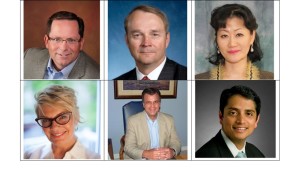This post focuses on lessons learned from several senior executive interviews on VoiceAmerica Radio. I want to thank everyone who was willing to participate; I have had the honor of talking to a range of highly accomplished executives from a variety of industries and backgrounds.

Letâs start with an example of an employee whose experience mirrors of one of our top interviews: people drive your success. Susan walked into her new job and was delighted that on her first day, her intuition about accepting the position proved correct. She left a great job (on paper) to be part of a professional organization that would be a better fit. Sheâd been looking for a place where the leaders understood that taking care of their people caused the organization to actually be more efficient and effective. Sheâd had plenty of experience with organizations that gave lip service to employee engagement and becoming a best place to work, and yet, at the end of the day, she didnât feel engaged. She felt harassed by ongoing assessments and pressure to deliver better scores rather than inspired by a true effort to improve the organization. Now she was the VP of Talent in an organization that genuinely treated people with respect. They recruited for mindset and offered ongoing training to ensure employees could meet the changing needs of the workplace.
After doing the interviews, I wanted to see what themes emerged from the group and share with readers who may not have had the opportunity to listen to all interviews.
Themes:
1. People differentiate your business and your ability to deliver on your unique brand as well as retain customers. Treat your people well and they will treat your clients well. Treat your people badly and they will be disengaged and damage your culture, your customer relationships and your profitability. See my earlier post on bad bosses for info about what treating your people badly means.
2. Hire for fit â train for skills. You can teach skills as the environment changes. Employees who are disruptive or an otherwise poor fit will damage your environment and your business (see #1). What I have often seen is leaders who wait too long to remove disruptive employees. Universally, after the challenging employee leaves, they wish they had done it sooner.
3. Effective transformation starts with leadership change and involves culture change and process and system change. All elements must be aligned to avoid creating forces that work against one another. This alignment is a dynamic equation involving continual rebalancing.
4. Effective leaders manage across functions, considering the best interest of all stakeholders to ensure the long term success of the organization, not just their departmental interests. By managing the dynamic balance and changing needs of key stakeholders (customers, employees, owners, funders, the long-term interest of the enterprise), the enterprise is able to best respond to ongoing complex changes.
5. An effective leader actively engages employees regularly, making sure they are clear on what to do and how to do it, and that they have what they need. Employees feel supported. They know that they are free to do their best, and when they make small mistakes in service of trying new things to improve themselves and the organization, they will not be browbeaten.
Do these themes strike you as true?
As a leader, how would you score yourself on these five themes (1 = I rarely do this, 3 = I occasionally do this, 5 = I consistently do this)?
How would you score your organization using the same scale?
If you believe these are true, but you are not consistently behaving in this way, do you work in an environment that would support you acting this way? If so, what behavioral experiments can you try to begin improving your own leadership? Can you pick a theme and identify a specific behavior that will be rewarded in your organization? What is that experiment? How will you know if you are successful? When will you start?
If you work in an organization that does not demonstrate these behaviors, is there one that might be rewarded?
SOâ¦.what can you do about becoming more effective? To become a more innovative leader, please consider listening to a wide range of the Innovative Leaders Driving Thriving Organizations interviews. Additionally, Metcalf & Associates offers on-line leader development programs, leadership assessments, a leadership development workbook series, workshops, coaching and executive advisory services.
About the author:
Maureen Metcalf is the CEO of Metcalf & Associates, Inc. is a leadership development and management consulting firm that uses an integrative approach to help leaders and their organizations innovate how they lead and how they operate, helping them thrive in a rapidly changing environment. She is an acclaimed thought leader who has developed, tested and implemented emerging models that dramatically improve leaders and contribute to organizational success.




